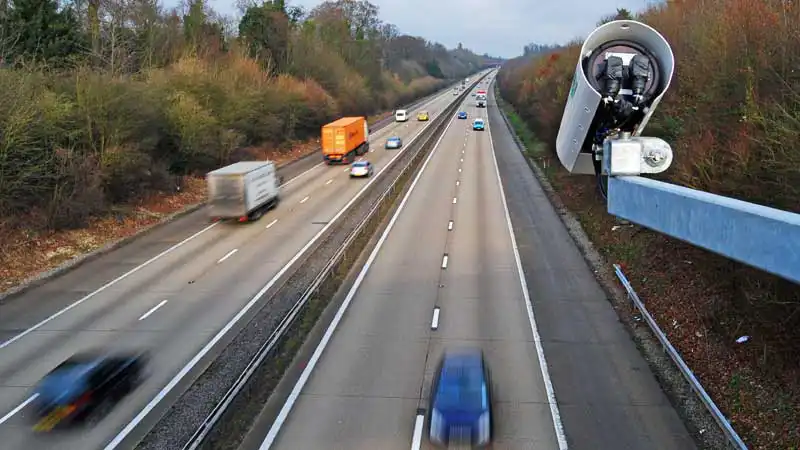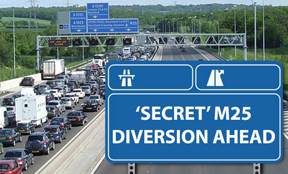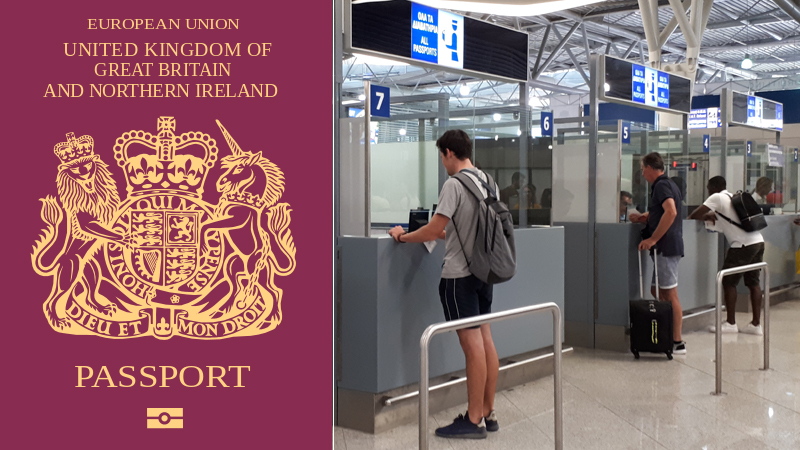
Have you been flashed by a speed camera in London or other towns and cities in the UK, and left with these questions: 'will I get a speeding ticket', 'how long does it take for a speeding ticket to arrive', 'what is the fine for speeding' and 'how many points on my licence will I get'? With reports of a huge increase in such offences during periods of quieter roads throughout the pandemic, motoring journalist and expert Pete Barden looks at what happens after the speed camera flashes - and how likely you are to get prosecuted, receive penalty points on your licence or even a ban.
If you're a repeat offender when it comes to speeding offences, you'll know how the system
works, but this guide is intended to help those who have been caught speeding for the first time prepare
for what happens next - from notice of prosecution to points or even disqualification.  Find out what happens after you think you've been caught by
a speed camera
Find out what happens after you think you've been caught by
a speed camera
-
TABLE OF CONTENTS
-
Will I get a speeding ticket?
-
How long does it take for a speeding ticket to arrive?
-
What is the fine for speeding?
-
Scroll down for much more information
-
How much do penalty points add to car insurance costs?
How much over the speed limit will get a speeding ticket?
Despite rumours that travelling just 1mph over the limit will trigger certain safety cameras, research from Auto Express published in 2019 revealed the tolerances of devices across the UK. The following shows magazine's research, revealing how cops across the UK set their speed cameras.
| Police force | Number of cameras | Camera activation threshold |
| Avon and Somerset | 41 | 10% + 2mph |
| Bedfordshire | 38 | Would not reveal threshold |
| Cambridgeshire | 32 | Would not reveal threshold |
| Cheshire | 15 | 10% + 2mph |
| Cleveland | 4 | 10% + 2mph |
| Derbyshire | 18 | 10% + 2mph |
| Devon and Cornwall | 98 | 10% + 2mph |
| Durham | 0 fixed | 10% + 2mph |
| Essex | 63 | Don't use a standard threshold |
| Greater Manchester | 235 | Would not reveal threshold |
| Gwent | 21 | 10% + 2mph |
| Hampshire | 36 | 10% + 2mph |
| Hertfordshire | 53 | Would not reveal threshold |
| Kent | 109 | 10% + 2mph |
| Lancashire | 34 | 10% + 3mph |
| Leicestershire | 30 | 10% + 2mph |
| Merseyside | 18 | 10% + 2mph |
| Metropolitan Police/TfL | 805 | 10% + 3mph |
| Norfolk | 26 | 10% + 2mph |
| North Wales | 28 | 10% + 2mph |
| Northumbria | 55 | 10% + 2mph |
| Nottinghamshire | 48 |
Refused to confirm if threshold exists
|
| Police Service of Northern Ireland | 12 | 10% + 2mph |
| Scotland | 173 |
Refused to confirm if threshold exists
|
| South Wales | 137 | 10% + 2mph |
| South Yorkshire | 25 | 10% + 2mph |
| Staffordshire | 286 | Would not reveal threshold |
| Suffolk | 4 | 10% + 2mph |
| Thames Valley | 294 | 10% + 2mph |
| Warwickshire | 28 | 10% + 2mph |
| West Mercia | 23 | 10% + 2mph |
| West Midlands | 33 | Would not reveal threshold |
| West Yorkshire | 402 | 10% + 2mph |
Will I always get a speeding ticket after being flashed by a camera?
Was the speed camera working, or were you even speeding? These questions can cause anxiety as drivers wait to find out if they were speeding. Fortunately, there are rules to ensure drivers are not left waiting for extended periods to find out if they're facing a fine, points, or even being banned from the roads.
Subscribe for free motoring and travel news here - support independent journalism
Will I always get a ticket if a camera flashes on a motorway like the M25?
With many motorways such as the M25 using more cameras, it is a common sight to see flashes as car pass - but will they always result in a ticket? Again, there is not definitive answer here, but the speed tolerances, revealed above, can be taken into account, or a speed awareness course could be offered instead of a fine and penalty points.
New cameras are digital now, so the old hope of camera's running out of film does not apply any more as the capacity for capturing speeding drivers is not virtually limitless.
The only way you can really know if you will get a speeding ticked is to wait and see if the notification arrives within 14 days
How long does it take to get a speeding ticket?
The police have 14 days to issue the registered keeper of the vehicle with a notice of intended prosecution (NIP). If this doesn’t arrive within this period, it’s likely there will be no ticket. However, motorists should get legal advice if a notice arrives after the 14 day period. Simply ignoring it could result in prosecution and further speed camera penalty points.
What must I do after getting a 'speeding ticket'?
How long will it take for the final ticket to arrive?
Once the NIP has been received and complied with - providing it was received within the 14-day-period - the case must move forward within six months. If this does not happen, the recipient should ask for the case to be withdrawn. Get legal advice if this is not agreed - and remember to keep a log of all dates involved.
What is the speeding ticket 14-day rule in the UK?
The 14 day limit is the amount of time Police have to process and send out the original Notice of
Intended Prosecution (NIP). It should arrive at the address of the accused within 14 days, but failure for
it to do so does not automatically mean the case is cancelled.
All the police have to do is prove
that in normal circumstances, the NIP would have arrived at the recorded address of the registered keeper
within 14 days.
However, if the date stamped on the NIP issued to you is beyond the 14 days, then the 14-day rule can be used to reject the ticket for being issued too late. Do not just ignore it, but appeal the ticket for the reason it is void.
Are speed cameras working in your area?
Research shows that 50% of all speed cameras in England and Wales are not working, according to new figures have revealed (applies to Police forces who responded).
Driving safety charity Road Angel discovered the figures through a campaign of Freedom of Information requests.
It was revealed 46% of all speed cameras were out of action across the county, meaning they could not spot driving offences.
This equates to 496 inactive devices out of a total of 1,069 across England and Wales.
It was found that only two police forces, Dyfed-Powys Police and Suffolk Police, had all speed cameras in action.
Derbyshire, Essex and Devon and Cornwall, the regions that have the most speed cameras in England, there were at least 40% out of action in each area.
Derbyshire was the worst for out of action camera, with just 20 of the its 113 cameras working.
Leicestershire only had four of its 18 fixed cameras working, while Cambridgeshire had 29 of 46 cameras not in action.
Related content
What happens next?
After you return the Section 172, you’ll be sent either a:
- Fixed Penalty Notice (FPN)
- Letter telling you to go to court
How much is a speeding fine and how many penalty points will I get?
New speed camera fines came into force on April 24, 2017. Your fine will be calculated based on your weekly earnings. The following table will help you work out how much this could be - and how many penalty points you could receive.
How much will a speeding fine be?
| Legal speed limit (mph) | Recorded speed (mph) | Recorded speed (mph) | Recorded speed (mph) |
|---|---|---|---|
| Band A | Band B | Band C | |
| 20 | 21-30 | 31-40 | 41 and above |
| 30 | 31-40 | 41-50 | 51 and above |
| 40 | 41-55 | 56-65 | 66 and above |
| 50 | 51-65 | 66-75 | 76 and above |
| 60 | 61-80 | 81-90 | 91 and above |
| 70 | 71-90 | 91-100 | 101 and above |
| Points/ disqualification | 3 points | Disqualify 7-28 days OR 4-6 points | Disqualify 7-56 days OR 6 points |
| Fine | 50% of weekly income* | 100% of weekly income* | 150% of weekly income* |
Depending on where you were caught speeding and how much you were exceeding the limit, you’ll be placed into one of the above bands.
Pensioners, the rich and non-working partners of the wealthy won't get away with paying more either. Take a look at the guidelines from the Sentencing Council for more details of how much you could be fined.
How much could penalty points for speeding and other offences increase your insurance premium?
Here is how much more you could pay, according to This Is Money, if you get penalty points added to your driving licence for offences such as speeding.
| Number of penalty points on your licence | Increase in your insurance price |
|---|---|
| 1-3 | 5.1% |
| 4-6 | 25.8% |
| 7-9 | 45.0% |
| 10-11 | 81.9% |
| 12+ | 89.3% |
Areas where most speeding tickets are issued
This data was recorded from January 2021 to January 2023. The data was obtained from Freedom of Interest requests sent to UK police forces - of which 23 out of 44 responded. As a result, the data here does not provide a complete representation of English roads.
- West Yorkshire – 224,160
- Avon and Somerset – 173,428
- Thames Valley – 151,501
- West Midlands – 95,093
- Surrey – 87,270
- Bedfordshire – 69,818
- South Yorkshire – 67,255
- Hampshire – 62,514
- Lincolnshire – 59,525
- Hertfordshire – 53,627
Can I check if I have been caught by a speed camera in the UK
There is no database is available to check if you've been caught speeding in the UK, so this is not possible. Instead, you will have to wait to see if a penalty notice is issued to your vehicle's registered address within a 14-day period.
Can I check if I have been given a speeding ticket in Spain or other EU countries?
Like the UK, there is no public-searchable database to reveal if you have been caught speeding in countries such as Spain, France or other EU countries.
Motoring content trending today...
Take a look at more of our top motoring-related content trending today:
-
Will I get a speeding ticket after being flashed
-
Do I need to wear a mask in my car under Plan B restrictions?
-
Are driving tests being cancelled due to Covid?
-
Do I need to tell the DVLA about having Covid-19?
-
Is the M6 Toll Road free on Christmas Day?
-
Do I need an electric car licence and driving test in the UK?
-
How can I find out who owns a car
-
Will I get a 6-month MOT extension because of the new Omicron variant this Christmas?
-
Do I need an international driving permit for France and Spain
-
How to spot a fake undercover police car
-
Is my green paper driving licence still valid and how much to swap for a photocard?
-
Can I drive in sliders in the UK - with or without socks
-
Electric car charging points at UK airports for public use - 2021
-
Are electric scooters a good Christmas present - find out the driving rules here
-
Are my sunglasses legal for driving?
-
Secret parking offences you're committing revealed
-
How old are my tyres - find out instantly here
-
What are the black dots on my windscreen for?
-
How far and how fast can I drive on a space saver spare wheel
Speeding fine calculator UK
Scroll down below this screen grab to fined out how you can use the speeding fine calculator for the UK.

The Sentencing Council has created a speeding fine calculator to help you find out how much you are likely to be fined if you're issued with a speeding ticket. Check out your speeding fine here.
How long are penalty points valid?
Speed camera penalty points are valid on your licence for three years from the date of the offence, or from the date of conviction if given in court. It will take four years to have the offence completely wiped from your record.
New drivers and penalty points
If you’re still within 2 years of passing your driving test, your driving licence will be revoked (withdrawn) if you build up 6 or more penalty points.
Top 10 sections of roads where drivers are caught speeding in England
1. A40 between Long Drive and Wellands Gardens E/B: 49,050 intended prosecutions by Metropolitan Police
2. M25 Junction 7-16, Surrey: 23,134 intended prosecutions by Surrey Police
3. M4 Junction 20-19, Bristol: 18,317 intended prosecutions by Avon & Somerset Police
4. A5460 Narborough Road, Leicester, Jnc with Fullhurst Avenue: 16,634 intended prosecutions by Leicestershire Police
5. M6 Junction 1-4 (Northbound and Southbound): 15,410 intended prosecutions by Warwickshire Police
6. Garston Way/ Dock Road, Liverpool: 15,295 intended prosecutions by Merseyside Police
7. M5 Junction 4a-6, Birmingham: 15,062 intended prosecutions by West Mercia Police
8. A282 Dartford Tunnel Approach Road: 14,423 intended prosecutions by Kent Police
9. Lewes Road, Brighton, Jnc with Coldean Lane: 14,172 intended prosecutions by Sussex Police
10. M6 Junction 7 & 8 N/B, Birmingham: 12,762 intended prosecutions by West Midlands Police
Source: Confused.com and its FOI request to UK police forces how many speed camera offences occurred in financial year 2021/22. The FOI requests received data from 36 out of 46 UK forces.
Analysis: Will I get a parking ticket based on age, gender, where I live and my race?
Speeding fines are a common occurrence on the roads of the United Kingdom, with millions of drivers facing penalties each year. However, the likelihood of receiving a speeding fine can vary significantly depending on various factors such as age, region, sex, and race. In this analysis, we will delve into the data and explore the disparities in the enforcement of speeding fines across these demographic categories in the UK.
Age
Age plays a crucial role in determining the likelihood of receiving a speeding fine. According to data from the UK's Department for Transport (DfT), younger drivers, particularly those in their late teens and early twenties, are statistically more likely to be involved in speeding-related incidents. In 2020, drivers aged 17 to 24 accounted for 28% of all car drivers involved in fatal crashes where exceeding the speed limit was a contributory factor.
This can be attributed to factors such as inexperience, overconfidence, and a tendency to take risks. As a result, drivers in this age group are more likely to be pulled over by law enforcement and issued speeding fines.
Moreover, the age factor can also influence the severity of fines. According to DfT data, in 2019, the average fine amount for drivers aged 25 and under was £171, compared to an average fine of £155 for drivers aged 25 to 49.
Region
The likelihood of receiving a speeding fine can also vary significantly based on the region in the UK. Urban areas with heavy traffic and a higher density of speed cameras tend to have a higher number of speeding fines. For example, London, with its extensive network of speed cameras and traffic enforcement measures, consistently reports a higher number of speeding fines compared to other regions.
In contrast, rural regions with less traffic enforcement infrastructure may have fewer speeding fines issued. However, this does not necessarily mean that drivers in rural areas are less likely to speed; it may simply be that they are less likely to be detected and fined.
Sex
While the impact of sex on the likelihood of receiving a speeding fine is often debated, studies have shown some differences in behaviour between male and female drivers. Historically, men have been more likely to engage in risky driving behaviours, including speeding. According to DfT data from 2020, men were involved in 74% of all speeding-related accidents.
This increased risk-taking behaviour has contributed to a higher likelihood of male drivers receiving speeding fines. However, it is essential to note that the gap between male and female drivers in terms of speeding fines has been narrowing in recent years. As societal attitudes change and more women take up driving, the disparities in speeding fine statistics between the sexes are likely to continue shrinking.
Race
Race is a sensitive and controversial topic when it comes to policing and traffic enforcement. While data on the racial breakdown of speeding fines in the UK is not readily available due to data privacy and discrimination concerns, studies in other countries have shown that racial profiling can be a problem in law enforcement.
To address potential disparities in traffic stops and fines based on race, many law enforcement agencies have implemented policies and training programs to ensure that traffic enforcement is carried out without bias. However, more research and transparency in this area are needed to fully understand the impact of race on speeding fines in the UK.
Conclusion
The likelihood of receiving a speeding fine in the UK can vary significantly depending on factors such as age, region, sex, and, potentially, race. Understanding these disparities is essential for policymakers and law enforcement agencies to develop effective strategies for traffic safety and enforcement. It is crucial to strike a balance between deterring dangerous driving behaviours and ensuring that enforcement is fair and unbiased across all demographic groups. Ultimately, road safety should be the primary goal, and efforts should be made to educate drivers and promote responsible behaviour on the road, regardless of their demographic characteristics.
Author: Pete Barden
Twitter: @pete_barden
Pete Barden is a qualified journalist who has written and produced for publications including The Sun (thesun.co.uk), New Statesman Media Group, Whatcar? (Whatcar.com) Stuff Magazine (Stuff.tv), Fastcar Magazine (Fastcar.co.uk), Maxim Magazine and UK broadcast stations within the Heart network (Formerly GCAP). Pete specialises in motoring and travel content, along with news and production roles. You can find out more about Pete Barden on LinkedIn.
Read all articles by Pete Barden











